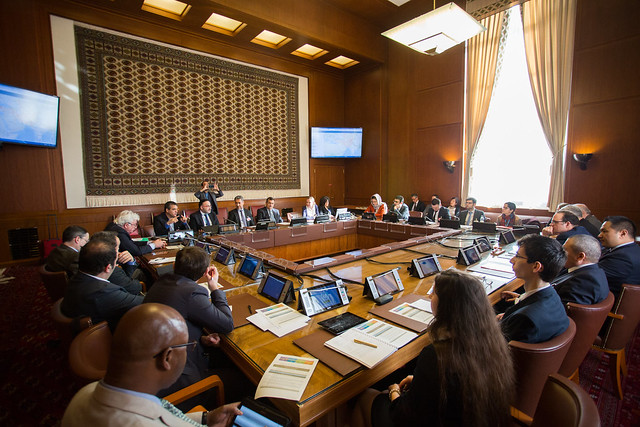Programme
The aim of the planned workshop was to present the benefits of accession and implementation of UN transport legal instruments, especially to the 11 common member States between the EATL project and the Islamic Development Bank (IsDB), as well as to exchange information on implementation practices and challenges. Since its creation in 1947, the Inland Transport Committee has been a framework for intergovernmental cooperation and concerted action in order to facilitate the development of transport while improving its safety and environmental performance.
High-level participants from non-UNECE countries supported by the IsDB had the opportunity to get an overview of the 58 UN transport agreements and conventions under the purview of the ITC and its subsidiary bodies. These conventions provide the international legal and technical framework for the road, rail, inland waterway and combined transport. They also provide for uniform and simplified border-crossing procedures, rules and regulations for transport of dangerous goods and harmonization of vehicle regulations. All legal instruments have triple impacts as they contribute to improved traffic safety, as well as to improved environmental performance of the sector, and finally they serve as facilitators for international movement of people and goods.
Participants gained understanding of the mechanism whereby the UN legal instruments are kept updated through the activities of the treaty bodies, i.e. the Administrative Committees, supported in this work by the Working Parties of the Inland Transport Committee.
The aim of the planned workshop was to present the benefits of accession and implementation of UN transport legal instruments, especially to the 11 common member States between the EATL project and the Islamic Development Bank (IsDB), as well as to exchange information on implementation practices and challenges. Since its creation in 1947, the Inland Transport Committee has been a framework for intergovernmental cooperation and concerted action in order to facilitate the development of transport while improving its safety and environmental performance.
High-level participants from non-UNECE countries supported by the IsDB had the opportunity to get an overview of the 58 UN transport agreements and conventions under the purview of the ITC and its subsidiary bodies. These conventions provide the international legal and technical framework for the road, rail, inland waterway and combined transport. They also provide for uniform and simplified border-crossing procedures, rules and regulations for transport of dangerous goods and harmonization of vehicle regulations. All legal instruments have triple impacts as they contribute to improved traffic safety, as well as to improved environmental performance of the sector, and finally they serve as facilitators for international movement of people and goods.
Participants gained understanding of the mechanism whereby the UN legal instruments are kept updated through the activities of the treaty bodies, i.e. the Administrative Committees, supported in this work by the Working Parties of the Inland Transport Committee.

